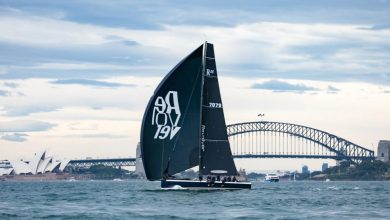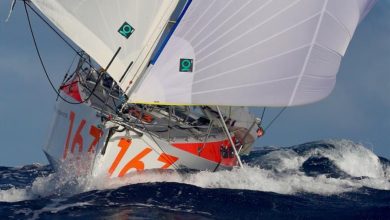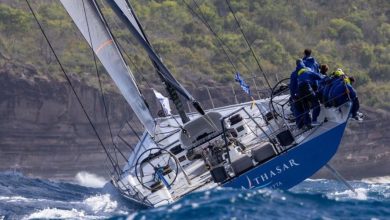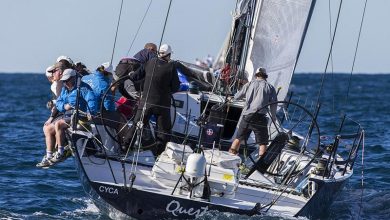Luna Rossa America’s Cup

This year sees Prada launch its fifth challenge for the America’s Cup, and pouring multi-millions into the cause. But, as the Financial Time’s Grace Cook discovers, there’s more at stake than winning the trophy
“I christen you Luna Rossa!” shouted Miuccia Prada through a microphone, standing on a cherry-picker on the seafront in Cagliari last October. Huddled in the small box along with her husband, Prada chief executive Patrizio Bertelli, and a priest in full vestments – who had just doused the boat with holy water – she proceeded to smash a champagne bottle against the hull of Prada’s new €65m America’s Cup yacht, which was suspended in the air by a crane.
The glass shattered and bubbles oozed down the side of the matte-black vessel – the boat’s baptism was complete.
With that, the 300-strong crowd who had gathered to watch went berserk. Cheers erupted, air horns blazed and water cannons exploded as the 75ft yacht was lowered into the water for the very first time. Bertelli – team principal of the Prada Luna Rossa crew – watched with bated breath, lest the yacht capsize. “I haven’t been on the boat yet,” he said, a look of palpable excitement spreading across his face. “Launching a new one is always exciting, but it’s particularly thrilling when it’s an unprecedented cutting-edge design like this.” The crane gave one final creak as the 6.5-tonne vessel was dropped onto the water, waves now lapping around its upright hull. Prada’s sailors on the shore let out a sigh of relief, but the ever-confident Bertelli insisted that he was “never worried” at the prospect. “I never doubted for one second that the boat would float. It’s the result of 78,000 hours of work,” he said, grinning.
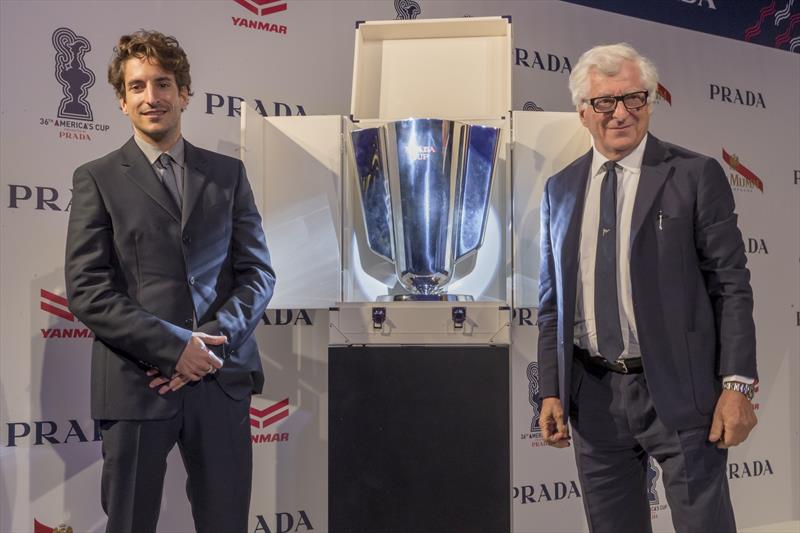
Lorenzo and Patrizio Bertelli at the Prada Cup Launch at Yacht Club Monaco – photo © Prada Cup
Luna Rossa’s watery activities have resulted in a newfound focus within Prada HQ; ocean health and a mission to clean up the seas. The brand is ploughing multi-millions into its cause. It began last year with an overhaul of the fabrics within Prada’s supply chain. When Luna Rossa partnered with The Woolmark Company to create sustainable merino sailing kits, the Prada fashion brand debuted its Re-Nylon accessories line crafted from waste fishing nets recovered from the sea. Then, as the sailing team joined forces with One Ocean Foundation (a non-profit dedicated to the protection of the seas), the Prada Group took out a €50m sustainability-focused loan from Crédit Agricole, the first of its kind, which rewards meeting ambitious sustainability targets with lower interest repayments.
And Prada is pushing this message commercially. Last year, the defunct Prada Sports line got a reboot under the name Linea Rossa. Chunky-soled “America’s Cup” trainers and sleeveless grey windbreakers with retro Prada branding that look strikingly reminiscent of the team kits are designed to appeal to the demographic that might otherwise be shopping at Nike. Luna Rossa also has its own fragrance collection, which includes a scent called Carbon – an environmentally astute perfume name for our times.
This change of direction is thanks in part to 31-year-old Lorenzo Bertelli, son of Miuccia and Patrizio; he joined the group in September 2017 as head of marketing and communications and swiftly shook things up. “Being a millennial, I immediately realised that sustainability is a priority,” says the former racing driver. “Sometimes intersection [between our group activities] happens by chance, sometimes it is indispensable.” After years of falling sales, Prada has tasked Bertelli with ushering the 1913-founded family-run brand into the next era by harnessing the interest of younger customers – and sustainability is key.
Re-Nylon was the first project to which the young Bertelli committed. “It’s the beginning of a new era for Prada. Nylon was one of the fundamental products that established Prada’s modern fashion identity,” he says of his mother’s refashioning of the synthetic fibre in the 1980s, when she turned a formerly naff textile into a covetable luxury product by putting it on the runway. The collection of nylon backpacks, belt bags and totes introduced in 1984 quickly became the brand’s best sellers, and remain so today; Lorenzo says using marine waste nylon “respects the brand’s heritage while looking forward to the next chapter”.
For the full story click here
by Grace Cook/Financial Times

